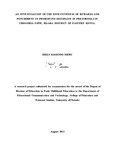| dc.description.abstract | This study involved a survey which undertook to find out the effectiveness of rewards and punishment in promoting discipline in preschools in Chogoria zone of Maara district, Eastern Kenya. The specific objectives included establishing the influence of rewards on children's respect for school rules as well as .class attendance. They also included finding out the influence of punishment on respect for school property and deviant behavior.The study population involved the teachers, parents and preschoolers of the preschools in Chogoria zone. The specific sample involved a total of 192 respondents who were sampled through simple random sampling method and the instruments used included questionnaires, observation and 'interviews.
The study found out that the way a child responds to teacher instructions can be viewed as indiscipline depending on whether the response is positive or negative. In addition, when parents and teachers give rewards, the influence is mostly positive. It is only in a few instances that the parents' and teachers' use of rewards does not have any influence on the children. Similarly, the use of punishment by teachers and parents brings about positive influence on the children. However, there are a few cases in which punishment does not amount to the desired effect.
The study also established that the use of rewards encourages respect for school rules as well as class attendance. It also discouraged the engagement in deviant behavior. The same case applies to the use of punishment in that its use led to curbing of deviant behavior and encouraging respect for the school property.
In conclusion, the use of rewards on preschoolers by both parents and teachers influences discipline by encouraging respect for school rules. Rewards also encourage class attendance by preschoolers thus generally, rewards promotes good behavior. Similarly, the use of punishment to a large extent affects discipline by reducing bad behavior and encouraging desired behavior instead. There are however a few instances in which the use of rewards and punishment does not achieve the desired outcome though this is rare.
From the study, the major recommendations are: whenever children make it mistake, they should be corrected in the best way possible so that they can grow to be responsible persons and that parents should not leave the burden of disciplining their children to the teacher- they should complement their efforts by disciplining the child whenever he/she is away from school.
For research purposes, the study recommends that further detailed research needs to be carried- out in Chogoria zone on the influence of the specific types of rewards - and punishment on discipline. This will bring out the most effective types of rewards and punishment to be used by parents and teachers which will in turn help them discipline the children more effectively. | en_US |

